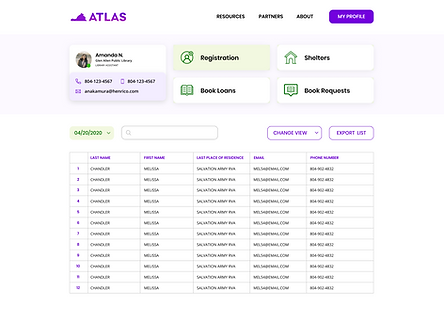
A collective of shared resources designed to connect Richmond’s libraries and shelters to empower the homeless population.
The Ask:
To design a service – a completely new one or to improve an existing service.
The homeless crisis is real and it’s happening everywhere, everyday.
Today, There are over 550,000 people in the United States experiencing homelessness on any given day, thats 1 in 194 people.
It’s estimated that women comprise a little under 40% of that population but this is a population that is typically overlooked.
Women and families are the fastest growing segment of the homeless population, with 85% of homeless families headed by single women.
A little over 600 people homeless are homeless in Richmond every day.
The Situation:
The Richmond Public Library isn't properly equipped to serve the homeless population and patrons in the city.
The presence of the homeless population at libraries has forced librarians to become makeshift social workers and first responders.
The Realization:
Despite being ill-equipped, the homeless population see libraries as safe havens.
70% of the visitors at Richmond’s Public Library at any given time are homeless.
Why Libraries?
The phenomenon of homeless people being drawn to public libraries is nothing new.
They are turning to libraries for:
-
Safety
-
Shelter
-
Are one of the only places they are allowed to go during the day when the shelters aren’t open
The Opportunity:
A chance to come together as a community for the better of humanity and for the better of Richmond and its people.
Homelessness doesn’t discriminate and access to information and resources shouldn’t either.
Access to information can create equal opportunities for everyone and is a right that every American should have.
Strategy:
Empower homeless women through equal access to information and resources to achieve a position of stability.
Introducing ATLAS:
At ATLAS, the primary individual that it seeks to help is the homeless patron, but understand that there is a need to help uplift librarians as well as shelter workers. ATLAS at its core is an aggregator, bringing the expertise and knowledge of all three parties together through digital spaces, physical spaces, as well as programs
Customer Journey

Part 1: Digital Resources
The foundation of ATLAS' digital strategy is an internal shared database that digitizes the rosters of these shelters and makes them accessible in a safe and secure platform for libraries to be able to cross-check patrons if they come in without the needed ID
Connecting Patron, Library, and Shelter:
-
One-stop shop highlighting key library and shelter resources
-
Shared internal database and roster between Richmond libraries and shelters

Personal Dashboard:
Library:
Validate patron identities in partnership with shelters, host book loan programs and manage requests
Shelter:
Share insights, opening times, building updates, programs
Patron:
Keep book wish list, favorite shelters, track reading progress

Recommended Reading Lists:
Curated book recommendations covering topics like eviction, stress support, mental health, wellness, financial health, pursuing higher education, and parenting
General recommendations for kids based on public school reading lists



Find Your Local Shelter:
Provides up-to-date information on all open local shelters in the area, and most importantly provides the user (Librarian or Homeless Patron) a “Check-In” countdown for each shelter.
Also provides the number for the RVA Homeless Crisis Line.
Part 2: Physical Resources
These physical takeaways that librarian provides for homeless patrons results in a much more pleasant and beneficial exchange. Most of the patrons questions about researching resources can be found on fliers and information key rings - such as...social workers organizations, local charities, government services, and steps on how to get your ID.
Resource Fliers:
ATLAS brochures, ID card guides, reading lists

Information Keyring:
ATLAS contact info, social worker organizations, local charities, govt. services

Part 3: Programmatic Resources
At the end of the day, we want to promote shared humanity, hope, and opportunity, and so the last leg of our solution is based in programs designed to give these homeless women with a voice and a platform
Job Workshops
Resumes, job hunt, soft skills, interview preparation
Patron-Led Talks:
Discussion boards with patrons, open and safe dialogue exchange
Patron Book Clubs:
Tailored reading for patron interests and pain points.
Book Lending Program:
Selected donation/lending program to shelters for community readings.
Roll Out Plan
Year 2 - 3
Year 1 - 2
Year 3 - 5
Introduce Pilot Program in partnership with charities and organizations like the Richmond Public Library, Salvation Army, and Caritas to incorporate feedback and iterations.
Take to the city level to pitch for larger implementation and hopefully have the whole city of Richmond implementing this.
Target county libraries around Richmond and then the rest of Virginia.
Barriers to Entry
Political
Agendas
Legality
Funding &
Resources
City
& State Discrepancies
Training
Willingness to Commit
Degree of Motivation
Team:
Marissa Liu: Experience Designer
Gaby Olivera: Experience Designer
Marnie Abraham: Strategist


